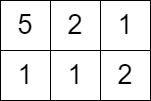Welcome to Subscribe On Youtube
2503. Maximum Number of Points From Grid Queries
Description
You are given an m x n integer matrix grid and an array queries of size k.
Find an array answer of size k such that for each integer queries[i] you start in the top left cell of the matrix and repeat the following process:
- If
queries[i]is strictly greater than the value of the current cell that you are in, then you get one point if it is your first time visiting this cell, and you can move to any adjacent cell in all4directions: up, down, left, and right. - Otherwise, you do not get any points, and you end this process.
After the process, answer[i] is the maximum number of points you can get. Note that for each query you are allowed to visit the same cell multiple times.
Return the resulting array answer.
Example 1:

Input: grid = [[1,2,3],[2,5,7],[3,5,1]], queries = [5,6,2] Output: [5,8,1] Explanation: The diagrams above show which cells we visit to get points for each query.
Example 2:

Input: grid = [[5,2,1],[1,1,2]], queries = [3] Output: [0] Explanation: We can not get any points because the value of the top left cell is already greater than or equal to 3.
Constraints:
m == grid.lengthn == grid[i].length2 <= m, n <= 10004 <= m * n <= 105k == queries.length1 <= k <= 1041 <= grid[i][j], queries[i] <= 106
Solutions
-
class Solution { public int[] maxPoints(int[][] grid, int[] queries) { int k = queries.length; int[][] qs = new int[k][2]; for (int i = 0; i < k; ++i) { qs[i] = new int[] {queries[i], i}; } Arrays.sort(qs, (a, b) -> a[0] - b[0]); int[] ans = new int[k]; int m = grid.length, n = grid[0].length; boolean[][] vis = new boolean[m][n]; vis[0][0] = true; PriorityQueue<int[]> q = new PriorityQueue<>((a, b) -> a[0] - b[0]); q.offer(new int[] {grid[0][0], 0, 0}); int[] dirs = new int[] {-1, 0, 1, 0, -1}; int cnt = 0; for (var e : qs) { int v = e[0]; k = e[1]; while (!q.isEmpty() && q.peek()[0] < v) { var p = q.poll(); ++cnt; for (int h = 0; h < 4; ++h) { int x = p[1] + dirs[h], y = p[2] + dirs[h + 1]; if (x >= 0 && x < m && y >= 0 && y < n && !vis[x][y]) { vis[x][y] = true; q.offer(new int[] {grid[x][y], x, y}); } } } ans[k] = cnt; } return ans; } } -
class Solution { public: const int dirs[5] = {-1, 0, 1, 0, -1}; vector<int> maxPoints(vector<vector<int>>& grid, vector<int>& queries) { int k = queries.size(); vector<pair<int, int>> qs(k); for (int i = 0; i < k; ++i) qs[i] = {queries[i], i}; sort(qs.begin(), qs.end()); vector<int> ans(k); int m = grid.size(), n = grid[0].size(); bool vis[m][n]; memset(vis, 0, sizeof vis); vis[0][0] = true; priority_queue<tuple<int, int, int>, vector<tuple<int, int, int>>, greater<tuple<int, int, int>>> q; q.push({grid[0][0], 0, 0}); int cnt = 0; for (auto& e : qs) { int v = e.first; k = e.second; while (!q.empty() && get<0>(q.top()) < v) { auto [_, i, j] = q.top(); q.pop(); ++cnt; for (int h = 0; h < 4; ++h) { int x = i + dirs[h], y = j + dirs[h + 1]; if (x >= 0 && x < m && y >= 0 && y < n && !vis[x][y]) { vis[x][y] = true; q.push({grid[x][y], x, y}); } } } ans[k] = cnt; } return ans; } }; -
class Solution: def maxPoints(self, grid: List[List[int]], queries: List[int]) -> List[int]: m, n = len(grid), len(grid[0]) qs = sorted((v, i) for i, v in enumerate(queries)) ans = [0] * len(qs) q = [(grid[0][0], 0, 0)] cnt = 0 vis = [[False] * n for _ in range(m)] vis[0][0] = True for v, k in qs: while q and q[0][0] < v: _, i, j = heappop(q) cnt += 1 for a, b in pairwise((-1, 0, 1, 0, -1)): x, y = i + a, j + b if 0 <= x < m and 0 <= y < n and not vis[x][y]: heappush(q, (grid[x][y], x, y)) vis[x][y] = True ans[k] = cnt return ans -
func maxPoints(grid [][]int, queries []int) []int { k := len(queries) qs := make([]pair, k) for i, v := range queries { qs[i] = pair{v, i} } sort.Slice(qs, func(i, j int) bool { return qs[i].v < qs[j].v }) ans := make([]int, k) m, n := len(grid), len(grid[0]) q := hp{} heap.Push(&q, tuple{grid[0][0], 0, 0}) dirs := []int{-1, 0, 1, 0, -1} vis := map[int]bool{0: true} cnt := 0 for _, e := range qs { v := e.v k = e.i for len(q) > 0 && q[0].v < v { p := heap.Pop(&q).(tuple) i, j := p.i, p.j cnt++ for h := 0; h < 4; h++ { x, y := i+dirs[h], j+dirs[h+1] if x >= 0 && x < m && y >= 0 && y < n && !vis[x*n+y] { vis[x*n+y] = true heap.Push(&q, tuple{grid[x][y], x, y}) } } } ans[k] = cnt } return ans } type pair struct{ v, i int } type tuple struct{ v, i, j int } type hp []tuple func (h hp) Len() int { return len(h) } func (h hp) Less(i, j int) bool { return h[i].v < h[j].v } func (h hp) Swap(i, j int) { h[i], h[j] = h[j], h[i] } func (h *hp) Push(v any) { *h = append(*h, v.(tuple)) } func (h *hp) Pop() any { a := *h; v := a[len(a)-1]; *h = a[:len(a)-1]; return v }